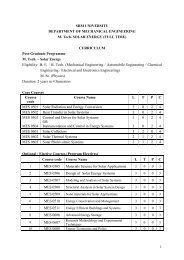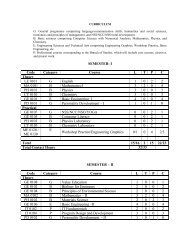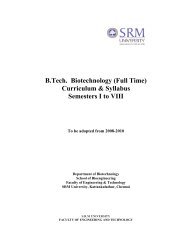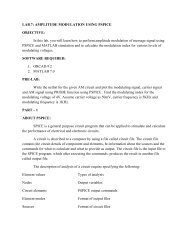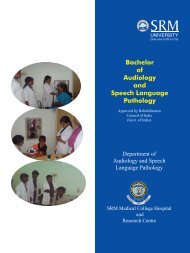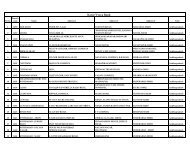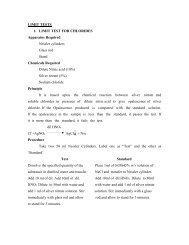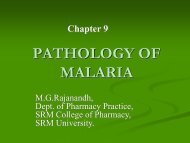âForensic Clinical Psychology as an Emerging ... - SRM University
âForensic Clinical Psychology as an Emerging ... - SRM University
âForensic Clinical Psychology as an Emerging ... - SRM University
Create successful ePaper yourself
Turn your PDF publications into a flip-book with our unique Google optimized e-Paper software.
in mentally retarded individuals, complicating diagnostic accuracy (Glick <strong>an</strong>d Zigler, 1995) noted<br />
that psychiatric in-patients with mental retardation demonstrated a signific<strong>an</strong>tly higher rate of<br />
expressing their symptoms actively, outwardly, <strong>an</strong>d aggressively in comparison to inpatients without<br />
mental retardation. Individuals presenting with both mental retardation <strong>an</strong>d psychiatric disorder<br />
are more likely to incur diagnoses that reflect aggressive <strong>an</strong>d <strong>an</strong>tisocial behavior th<strong>an</strong> psychiatric<br />
patients of normal intelligence. Hence thorough diagnostic evaluation in legal situations where<br />
there is <strong>an</strong>y suspicion of mental retardation is herded (Kinsler et al., 2004)<br />
Criminal Responsibility: Individuals with mental retardation suffer at every stage in the criminal<br />
process from the moment of arrest through the trial process. They are at a disadv<strong>an</strong>tage because of<br />
the social defects <strong>as</strong>sociated their disability. When first arrested, individuals with mental retardation<br />
may do not realize the gravity of the charges <strong>an</strong>d simply know that they are in trouble <strong>an</strong>d afraid,<br />
<strong>an</strong>d blurt out confessions. The mentally retarded individual may not be aware of the need for legal<br />
counsel.<br />
Competence to St<strong>an</strong>d Trial: Competence to st<strong>an</strong>d trial is a complicated issue with these mentally<br />
retarded defend<strong>an</strong>ts. If a defend<strong>an</strong>t sufficiently presents the ability to consult lawyer with<br />
a re<strong>as</strong>onable degree of rational underst<strong>an</strong>ding, <strong>an</strong>d factual underst<strong>an</strong>ding of the processing<br />
against him, it implies that the individual is able to utilize knowledge to <strong>as</strong>sist their lawyers <strong>an</strong>d<br />
thus participate defense. M<strong>an</strong>y mentally retarded defend<strong>an</strong>ts are unable to weigh options<br />
<strong>an</strong>d make re<strong>as</strong>onable decisions regarding how to h<strong>an</strong>dle the c<strong>as</strong>e. The forensic clinici<strong>an</strong> h<strong>as</strong> to<br />
conduct a thorough, <strong>as</strong>sessment <strong>an</strong>d <strong>as</strong>k questions to evoke recitation of facts <strong>an</strong>d also <strong>as</strong>sesses a<br />
defend<strong>an</strong>t’s rational underst<strong>an</strong>ding by <strong>as</strong>king. Criminal responsibility is ultimately determined by<br />
the court; however, forensic evaluators may offer clinical opinions regarding the extent to which<br />
mental retardation might affect a defend<strong>an</strong>t’s ability to appreciate the wrongfulness of the crime<br />
committed. As committed mental retardation itself is not <strong>an</strong> adequate defense against a criminal<br />
act, yet, forensic evaluators c<strong>an</strong> play a vital role by documenting specific deficits <strong>as</strong> they pertain to<br />
criminal offenses committed by mentally retarded defend<strong>an</strong>ts.<br />
A forensic report should address three main issues. First, a thorough review of the individual’s<br />
history with special attention paid to <strong>an</strong>y signs of cognitive deficits or developmental delays noted<br />
prior to age 18. Second, <strong>an</strong> intelligence test should be used to <strong>as</strong>sess the current intellectual deficits.<br />
A recent survey of forensic experts conducted by Lally (2003), the Wechsler Adult Intelligence Scales<br />
– Third Edition (WAIS-III) w<strong>as</strong> rated <strong>as</strong> a “recommended” or “acceptable” instrument to evaluate<br />
issues of competency <strong>an</strong>d mental state at the time of offense. Third, the evaluation should include<br />
a me<strong>as</strong>ure of adaptive functioning, of which several are routinely used (e.g., Vinel<strong>an</strong>d Adaptive<br />
Behavior Scales). Such instruments are typically completed by interviewing caregivers or relatives,<br />
which enables to rate the individual on a variety of functional domains. These ratings include some<br />
<strong>as</strong>sessment of social functioning, communication skills, <strong>an</strong>d daily living/self-care t<strong>as</strong>ks. When<br />
mental retardation h<strong>as</strong> been established historically or through current evaluation, the evaluator<br />
must explore specific deficits <strong>as</strong>sociated they relate to the legal question. If <strong>an</strong> individual meet the<br />
criteria for diagnosis of mental retardation <strong>an</strong>d deficits in his “factual” <strong>an</strong>d “rational” underst<strong>an</strong>ding




